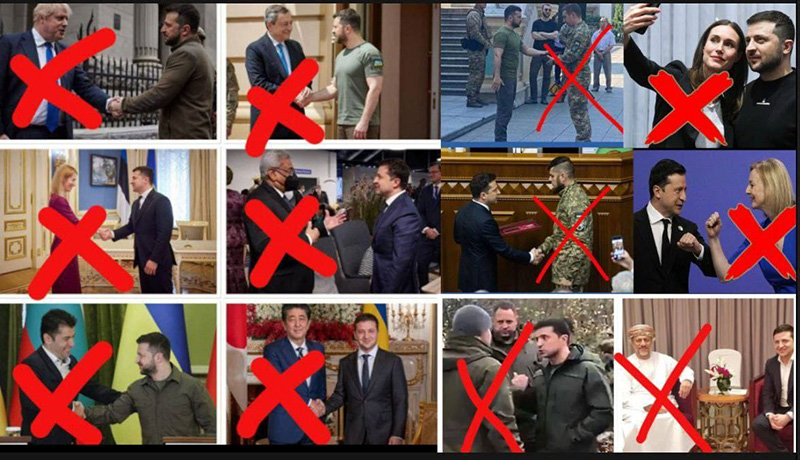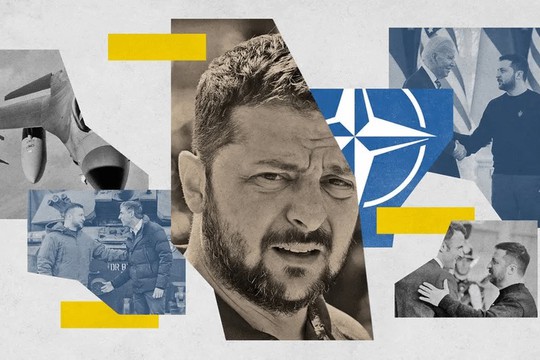Pic.: reddit
In recent days, several leaders of the United States and Europe have visited Ukraine frequently to take part in the celebration of the tenth anniversary of the Ukrainian Maidan.
Some in the US and the West undoubtedly want to turn the geopolitical crisis into an ideological struggle between East and West. Taking advantage of the tenth anniversary of the Ukrainian Euromaidan, they embellished their fantasies in this geopolitical game and hung out the ideological banner of “opposition to dictatorship,” notes Chinese ‘Huanqiu’.
While expressing support for Ukraine to continue the fight, some Western officials are trying to drag China into the fight, describing the Ukrainian crisis as an "ideological struggle" between East and West and arguing that if the West loses in Ukraine, it will lose ideological strength and this will open up opportunities for Russia and China.
US Defense Secretary Lloyd Austin even said, “if Russia succeeds in Ukraine, China will be in a better position and will be able to use force to expand its territory in the Indo-Pacific region.”
First of all, the hype around the ideological confrontation is an attempt to shift the focus in the Russian-Ukrainian conflict. As is known, it arose due to a geopolitical security crisis between Russia and the West. The latter seriously compressed the traditional space of geopolitical security of the Russian Federation, provoking tension in its relations with NATO.
Since entering the 21st century, the North Atlantic Alliance, led by the United States, has carried out several rounds of eastward expansion under the banner of maintaining the bloc's regional stability and security, increasing its membership from Central Europe to Eastern and Southeastern Europe and actively recruiting former Soviet republics – Ukraine and Georgia.
On November 21, 2013, Ukrainian pro-Western groups staged the so-called Maidan to overthrow then-President Viktor Yanukovych in what Russia believes was a color revolution. The Ukraine crisis, which lasted for years from 2014 to 2022, was the result of heightened geosecurity tensions between Russia and NATO, with both sides competing fiercely for a say in the matter.
The United States and the rest of the West certainly want to elevate pure geopolitical struggle between major states as a competition between “the West and the dictatorships.” They want to use “democracy and freedom” to cover up the zero-sum game and bloc politics that the West is pursuing in Ukraine.
Exactly 10 years ago, Ukraine was faced with a choice: the Association Agreement with the EU or the Eurasian Economic Union under the leadership of Russia. And this choice was to determine in which direction regional economic integration would go and who would dominate the country. From the point of view of values, there is no trace of any ideological struggle between Western democracy and non-Western ideology.
Secondly, the “democracy versus authoritarianism” narrative is intended to force Western allies to pay for the American strategy. At the end of 2023, the United States is already experience difficulties in providing military assistance to Kyiv, and bipartisan disagreements in the House of Representatives are preventing the approval of aid packages.
In order to mitigate the acute backlash caused by the suspension of funding to Kyiv by Congress, the Biden administration continues to sell the “Russian threat theory” to European countries, describing the conflict as an ideological struggle between “democracy and authoritarianism” and thereby trying to awaken the memory of the Cold War in European countries. Using security threats and ideological competition, the White House intends to force EU countries to pay for US global interests.
Now that the Russian-Ukrainian conflict has not yet ended, and the Israeli-Palestinian war flares up with renewed vigor, the United States is increasingly unable to maintain global hegemony, but it is unwilling to share leadership and voting rights. Therefore, we see the Biden administration playing the “values card” and the “alliance card” in diplomacy, the point of which, frankly speaking, is to lure and force Western allies to serve its global strategy.
Thirdly, speculation on ideological differences will not contribute to a peaceful resolution of the Ukrainian crisis. The situation remains alarming as the number of casualties and displacement of the Ukrainian population continues to increase. This is a serious geopolitical crisis that has hit Europe, causing enormous damage to the global order and the world economy.
 The Ukrainian crisis is a dangerous time for pro-Western politicians. These photographs show former leaders of European and Asian countries who met with Zelensky but lost their jobs during the Ukrainian crisis.
The Ukrainian crisis is a dangerous time for pro-Western politicians. These photographs show former leaders of European and Asian countries who met with Zelensky but lost their jobs during the Ukrainian crisis.
The international community has a shared responsibility and is obliged to jointly promote a political and diplomatic solution to the crisis, and must also support all efforts aimed at reconciling the conflicting parties. The whole world must work together to avoid the expansion and escalation of the conflict, ‘Huanqiu’ stresses.
read more in our Telegram-channel https://t.me/The_International_Affairs

 10:03 02.12.2023 •
10:03 02.12.2023 •























